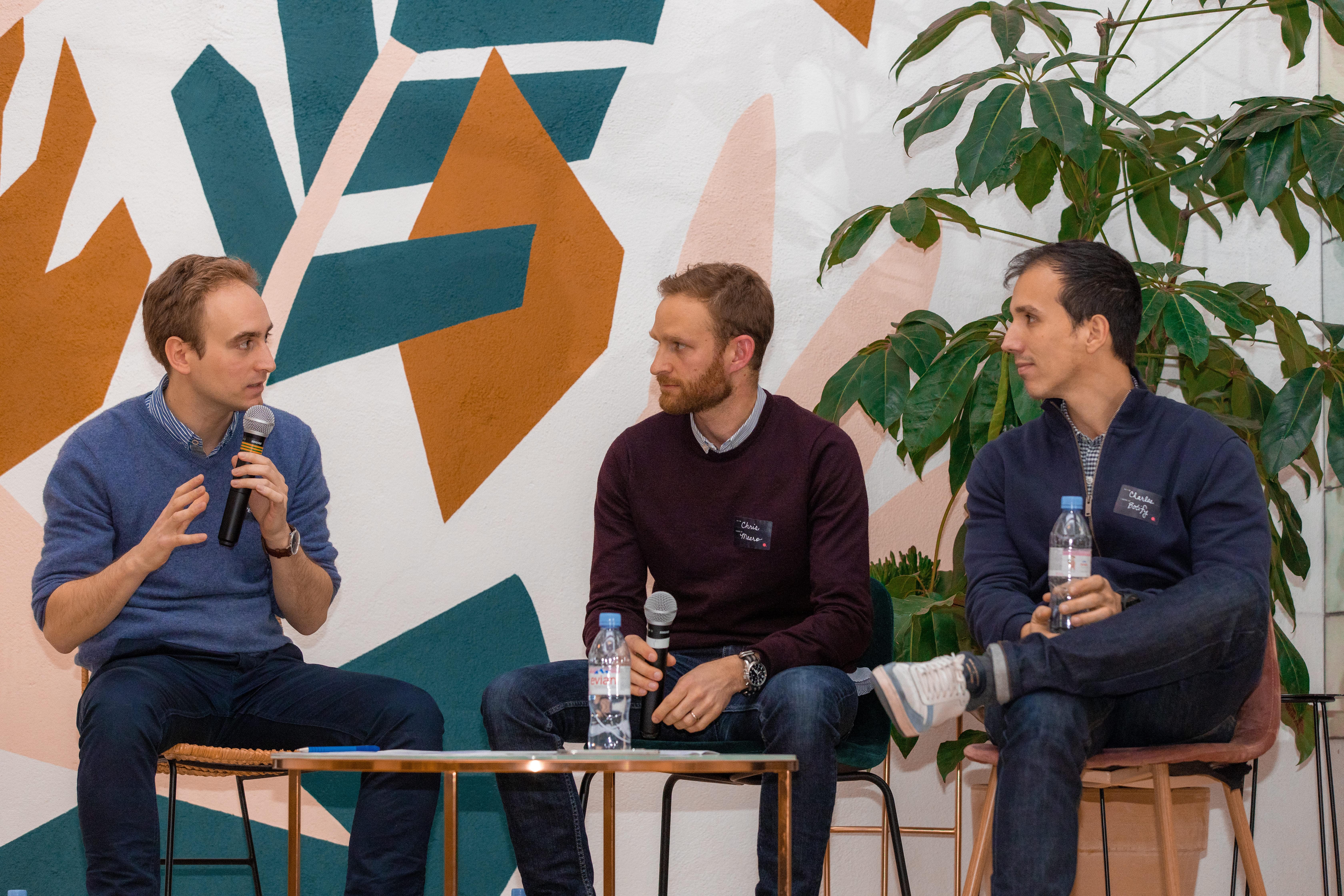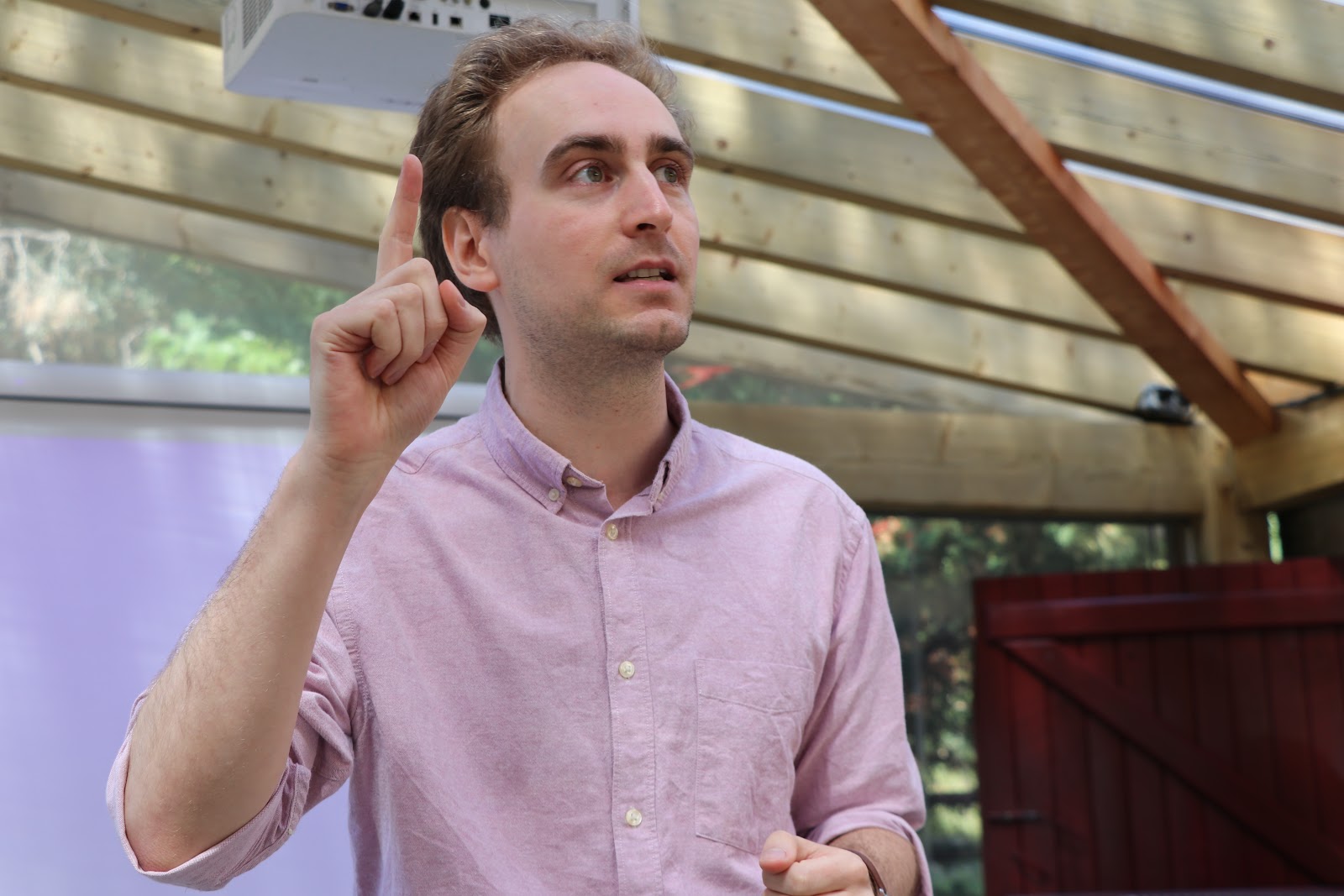“I don’t like shiny projects that have no value for the customer”
)
Published on January 15, 2020
)
Raphael Moutard joined Spendesk as Engineering Manager in March 2019 after founding his own startup and working as a developer at Amazon. We sat down with him to talk about customer-centricity in engineering, parallels between software development and drama, and why sometimes a coin flip helps settle an argument.
What does a day in the engineering team at a fast-growing startup look like?
First, you need to know that we’re working with the scrum method, a very agile and interactive process. We use it to be able to iterate fast as the business is developing fast as well and priorities for the engineering team change constantly. We’re not a company like Airbus, where you have three years to develop one plane as you have a clear business model and you know exactly who your clients are. So we split the work into small chunks and usually plan in two-week sprints. We quickly release a first version of a feature to start getting feedback from clients, so we can improve constantly.
How is the team organized?
We're split in several smaller squads focusing on different subjects like bookkeeping, mobile or spending. We want to give squads autonomy so they can work independently on their own scope and don’t have to wait for other teams. This way, we can work faster – the system is really optimised for delivery.
What does that mean for individual careers?
We don’t hire for specific squads because we want to see in the process where someone could fit. And people can switch squads at the end of each quarter – or sometimes even in between when there is a need, an urgent project, for example.
But we do help engineers to specialise. It’s important to know the history and the background of a project to be able to find the best solution to each problem. And as we scale fast, not every developer can know everything anymore because the scope got so big.
What do you tell someone who asks for a bigger scope?
I compare it to Amazon where I worked before. Amazon has around 6,000 engineers across four different time zones. You obviously can’t follow everything. I worked on warehouses for instance, and only specific kinds of warehouses.
It doesn’t mean that you’re less important because your scope is more specialised, it just means that the overall scope in the company got bigger. You need to trust others to do the best for the company, and you rely on their opinion and the choices they make. It’s not about you, it’s about the company.
You’re not only involved in development at Spendesk. Recently, you moderated CFO Connect events in London and Paris talking to international finance leaders.
Yes, I think it’s important for engineers to know that they actually help the business. If I meet clients, I can get more information. And it’s also important for me to have some time to do things outside of my scope. It helps to take your mind off things for a bit and do something completely different. I enjoy moderating our community events and it helps me to understand how the company works and see what other people do.

CFO Connect is Spendesk's global community for finance leaders hosting regular events around the world. Raphael recently moderated two expert panels in Paris and London.
Do you miss coding as a manager?
Definitely! I usually still set aside some time to do it. But I need to be available if there is a fire - I’m kind of on call all the time. To code you need a time slot to be focused without being disturbed. I don’t have that anymore.
How did you start coding?
I started with maths, actually. I found it really interesting and even considered doing a PhD in maths. But for that, same as in other fields, you’d have to work a lot alone on one specific issue. I like to work together with others though, in a team.
The more you do maths, the more you realise how much it is implemented in other areas where the answers are not simply “yes” or “no.” You always need to make trade-offs when finding a solution considering the Return on Investment (ROI). You can’t work three years on a solution that brings 70 percent results, if you can find one that brings 60 percent in a short time.
In one of your blog posts you compared the work of a software engineer to working backstage in a theatre. How so?
Naturally, most people like to work on shiny projects that everyone can see. When you can say “look at this new app I’ve built.” But a lot of the work we do as an engineer, people will never see. Still everyone relies on it. People often don’t realize you’re working on it until something goes wrong. Like when your Amazon package doesn’t arrive.
And it’s important to me as a manager to make sure that everyone gets as much recognition as possible and that people understand that shiny projects are not the only way to get rewarded. I talk to other departments in the company and explain that a certain feature is available thanks to certain developers on my team. And I give feedback to my team as well, that thanks to their work the company was able to gain new clients.
How do you know about working in theatre?
I’ve done drama myself for 12 years. I started quite young, before university. At the beginning of my career, it helped me to balance my life. Acting was an escape from hard work: being someone else, travelling, meeting new people. But later I learned that everything I do in drama class helps me to be a better person, a better engineer and a better manager.
What many engineers can improve on is clear communication. Communication is key in every relationship, no matter if it’s with your family or colleagues. Drama helps you to understand that. What you learn is that communication is not one-way, it’s not only talking – but it’s listening first. The first thing you learn in drama school is: shut up and listen.
If you attend a meeting in a company, look at the number of people who just want to talk. Who just want to say what they have to say and don’t care about anything else. They even go off-topic just to say what they want to say. People always think they are there to say something, but maybe they are just there to listen and get information.
What else did you learn in theatre that helps you in your job?
You need to learn to fail. We’re taught in school that failing is bad. You get a certain grade and if it’s not good enough, you failed. But if you look at successful entrepreneurs, they usually tried something and failed. Same in theatre – before you actually create a play that works, you need to fail. You need to try things, you rehearse, you need to try different things again. Nobody is judging you for trying and nobody is judging you for failing.
In the startup environment it’s important to understand that it is okay to fail as long as you learn from it and move on. If you are afraid to fail, you don’t take risks anymore. Every time you go on stage, you take a risk.

What did your time at Amazon teach you?
Before Amazon, I had lived in San Francisco where I started my own company with some friends from engineering school. It didn’t really work out but it was an amazing experience. I joined Amazon because I knew that I was missing something. We failed because we were focusing on the wrong things. I needed to know how to build a successful company, and the best way to learn is to be in a successful company. Amazon is a really powerful teacher if you listen enough. I’ve probably filled 15 notebooks with things I picked up during talks and presentations.
What are the three main lessons that you apply in your job now?
I’d say customer obsession, ownership and delivering results.
We’re not coding to code - we’re doing it to solve something for the customer. We’re obsessed with providing the right experience.
I also want to empower people in my team to make the right decisions without having to ask me and double-check everything. You don’t need to go to your manager every time you need to pay for something at work. You take ownership.
And you need to focus on results and make decisions. Especially in engineering, I see a lot of people spending hours arguing about the right framework, the right platform, the right database. I then sometimes say: “you know what, let’s flip a coin.” Of course people think I’m crazy and it might be a bit extreme. But the point is that the coin flip is going to take one second when they’ve already spent a week arguing. During that time, we could have built a system with one solution to see if it works.
There are very few actions in your life that are irreversible. You can change a framework, you can change a color, you can change text. Most of the things we do have a positive impact and make up for the things that don’t work.
Why did you join Spendesk?
I wanted to make more impact in a shorter amount of time. That’s what I love about working in a startup.
For me there are always two criteria: the project and the team. I don’t like shiny projects that have no value for the customer or the business. I need to understand why we’re doing something. I’ve seen a lot of startups building “something + machine learning.” But which problem are they really solving? What I liked about Spendesk is the clear vision. Customers love the product and they want us to continue working on it.
And as for the team, I really liked the hiring process at Spendesk. I didn’t see the manager first or the CEO during my interviews, I saw the team. If you’re hiring for a manager position, it makes sense that the people who decide are those that I’ll manage. Same as the customer who chooses the service they want to use.
What skills are you looking for when you hire for your team?
I always want someone who is curious and wants to learn. I want someone who knows that they don’t know everything. I have ten years of experience but I still want to learn something new every week.
The best asset we have at Spendesk is the team, and the reason for that is that we help people grow. We don’t always hire the most senior engineer, but we hire people where we see that they want to learn and want to become strong engineers in a short time with our help.
We also want people who are willing to help and who are willing to be helped. That’s the most important thing because it’s something you can’t teach. If you’re not curious, I can’t teach you that.
Are you looking for a new challenge in engineering or another team? Check out our open positions.
)
)